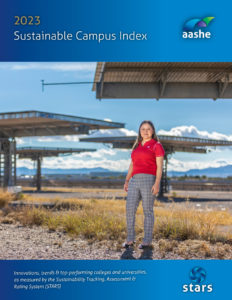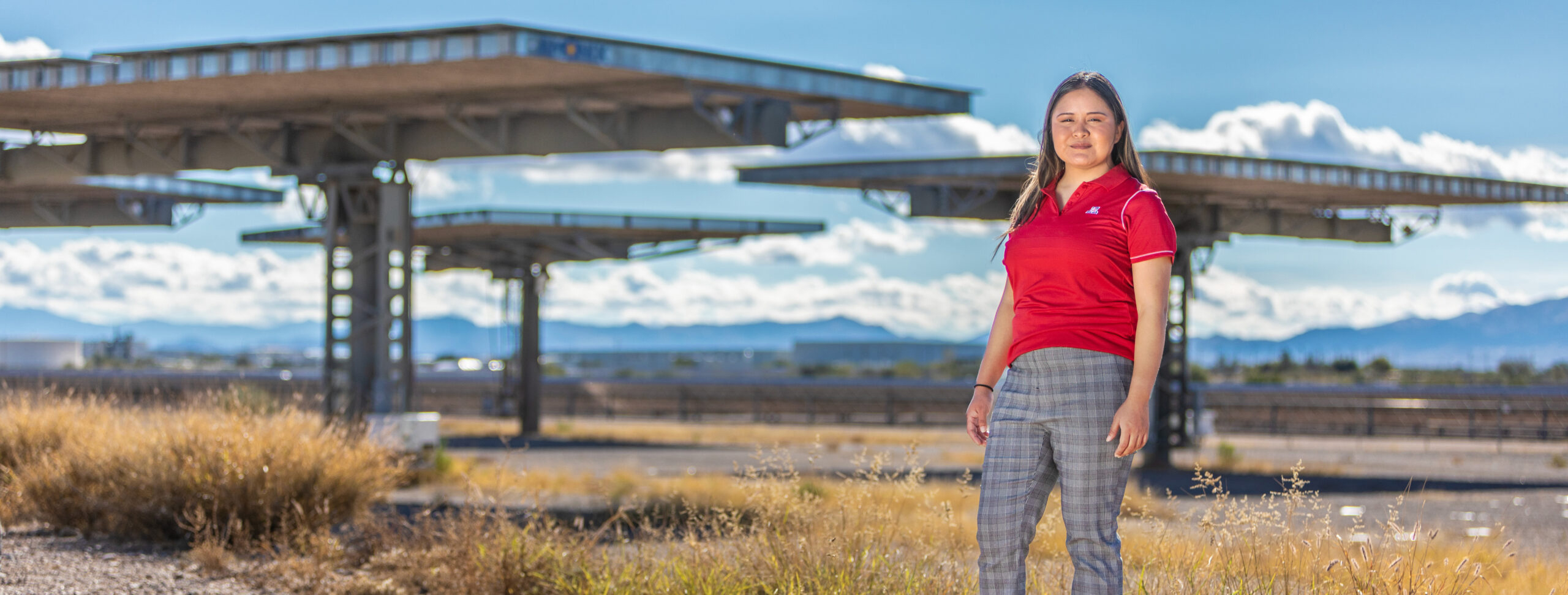T he 2023 Sustainable Campus Index (SCI), produced annually by the Association for the Advancement of Sustainability in Higher Education (AASHE) recognizes top-performing colleges and universities by country, institution type, and in 17 sustainability impact areas, as measured by the Sustainability Tracking, Assessment & Rating System (STARS). Used by hundreds of colleges and universities, STARS helps institutions measure, report, and strengthen their contributions to global sustainability. A new Trends & Highlights section recognizes trends in higher education sustainability and high-impact projects and initiatives. The SCI also spotlights institutions with exceptional STARS report accuracy and quality.
he 2023 Sustainable Campus Index (SCI), produced annually by the Association for the Advancement of Sustainability in Higher Education (AASHE) recognizes top-performing colleges and universities by country, institution type, and in 17 sustainability impact areas, as measured by the Sustainability Tracking, Assessment & Rating System (STARS). Used by hundreds of colleges and universities, STARS helps institutions measure, report, and strengthen their contributions to global sustainability. A new Trends & Highlights section recognizes trends in higher education sustainability and high-impact projects and initiatives. The SCI also spotlights institutions with exceptional STARS report accuracy and quality.
Since 2019, APPA has published excerpts from the annual Sustainable Campus Index with the gracious permission of AASHE. Following you’ll find a short description of each of the 17 impact areas, along with some of the top institutions that are doing great work as identified by STARS.
IMPACT AREAS
![]()
 Air & Climate
Air & Climate
Global climate change brings myriad negative impacts throughout the world, including increased frequency and potency of extreme weather events, sea-level rise, species extinction, water shortages, declining agricultural production and the spread of diseases. The impacts are particularly pronounced for low-income communities and countries. Institutions that inventory and take steps to reduce their air pollutant emissions can positively impact the health of their local communities and regions. This section covers greenhouse gas emissions assessment and mitigation and outdoor air quality.
- Arizona State University
- Dickinson College (PA)
- Université Laval (QC)
- University of Tasmania (Australia)
- Bates College (ME)
- Dawson College (QC)
- Université de Sherbrooke (QC)
 Buildings
Buildings
Buildings are generally the largest user of energy and the largest source of greenhouse gas emissions on campuses. Buildings also use significant amounts of potable water. Institutions can design, build and maintain buildings in ways that provide a safe and healthy indoor environment for inhabitants while simultaneously mitigating the building’s impact on the outdoor environment. This section covers the maintenance and operations of existing buildings as well as new building design and construction.
- University of California Irvine
- Agnes Scott College (GA)
- Nova Scotia Community College
- Thompson Rivers University (BC)
- University of California Los Angeles
- Carnegie Mellon University (PA)
- Williams College (MA)
 Campus Engagement
Campus Engagement
Engaging in sustainability through co-curricular activities allows students, faculty and staff to deepen and apply their understandings of sustainability principles. Co-curricular sustainability offerings help to integrate sustainability into the campus culture and encourage behavior changes that promote sustainability. This section covers student and employee sustainability education programs and orientations, assessment of sustainability culture, outreach materials and campaigns.
- Université de Sherbrooke (QC)
- University of Connecticut
- Colorado State University
- Furman University (SC)
- Cornell University (NY)
- American College of Greece
- Emory University (GA)
 Coordination & Planning
Coordination & Planning
Coordination and planning help institutions organize, implement, and publicize sustainability initiatives. These efforts provide the infrastructure to foster sustainability, establish priorities, guide decision making and budgeting, and clarify a vision for a sustainable future. This section covers sustainability planning, coordination, and participatory governance.
- Cornell University (NY)
- Humber College (ON)
- University of Sydney (Australia)
- University of Tasmania (Australia)
- Dalhousie University (NS)
- Oregon State University
- University of California Irvine
 Curriculum
Curriculum
Higher education institutions are uniquely positioned to understand and address sustainability challenges. Colleges and universities equip students to lead society to a sustainable future by developing and offering learning opportunities in sustainability. This section covers courses, programs and learning outcomes in sustainability, living laboratory initiatives, immersive experiences, sustainability literacy, and faculty development.
- Colorado State University
- SUNY College of Environmental Science and Forestry
- Sterling College (VT)
- Université Laval (QC)
- Florida Gulf Coast University
- Stanford University (CA)
- Arizona State University
 Diversity & Affordability
Diversity & Affordability
Higher education opens doors to opportunities that create a more equitable world and must be accessible to all regardless of race, gender, religion, socioeconomic status, and other differences. A diverse body of students, faculty and staff provide rich resources for learning and collaboration. This section covers diversity coordination, assessment for campus equity, discrimination response, higher education affordability and access, increasing faculty diversity, and support and recruitment of underrepresented students, faculty, and staff.
- Stanford University (CA)
- University of Texas Rio Grande Valley
- Yale University (CT)
- Cornell University (NY)
- Université de Sherbrooke (QC)
- University of Michigan
- Boston College (MA)
 Energy
Energy
Energy consumption is the largest source of greenhouse gas emissions for most institutions. Implementing conservation measures and switching to renewable energy helps institutions save money and protect them from utility rate volatility. Renewable energy may be generated locally and allows campuses to support local economic development. Institutions help shape markets by creating demand for cleaner, renewable energy sources. This section recognizes energy reduction and development and use of clean and renewable energy sources.
- Thompson Rivers University (BC)
- Bates College (ME)
- Emerson College (MA)
- Stanford University (CA)
- Middlebury College (VT)
- American College of Greece
- Bennington College (VT)
 Food & Dining
Food & Dining
Institutions can use their food purchases to support local economies, encourage environmentally friendly and humane farming methods, help eliminate unsafe working conditions, and alleviate poverty for farmworkers. These actions reduce environmental impacts, preserve regional farmland, improve local food security, support fair and resilient food systems, and reduce food waste. Dining services support sustainable food systems by making low-impact dining options available and educating customers about more sustainable options. This section covers meatless dining and sustainable food and beverage purchasing and practices.
- Sterling College (VT)
- University of Pennsylvania
- Southwestern University (TX)
- University of Connecticut
- Stanford University (CA)
- Emory University (GA)
- University of Southern California
 Grounds
Grounds
Beautiful and welcoming campus grounds can be planned, planted, and maintained in any region while minimizing the use of toxic chemicals, protecting wildlife habitat, conserving resources, and promoting organic care. This section covers campus land management, sustainable landscaping, and biodiversity of campus grounds and surrounding lands.
- Cascadia College (WA)
- University of Washington Bothell
- George Washington University (DC)
- Humber College (ON)
- HEC Montréal (QC)
- McGill University (QC)
- University of Saskatchewan (SK)
 Investment & Finance
Investment & Finance
Collectively, colleges and universities invest hundreds of billions of dollars, and the impacts from investments are both local and global in scope. Using transparent and democratic investment processes improves the long-term health of institutional endowments, encourages better corporate behavior, supports innovative product development and builds a more just and sustainable financial system. This section covers sustainable investment, committees for responsible investing and investment disclosure.
- SUNY College of Environmental Science and Forestry
- University of New Hampshire
- Arizona State University
- California State University Dominguez Hills
- Colorado State University
- National Tsing Hua University (Taiwan)
- Warren Wilson College (NC)
 Public Engagement
Public Engagement
Engagement in problem-solving with community members and organizations in the governmental, nonprofit and for-profit sectors encourages widespread solutions to sustainability challenges. Public engagement helps students develop leadership skills while deepening their understandings of practical, real-world problems and the process of creating solutions. This section covers community and inter-campus partnerships, continuing education, community service, public policy participation, and trademark licensing.
- University of Connecticut
- Cornell University (NY)
- Université de Sherbrooke (QC)
- SUNY College of Environmental Science and Forestry
- University of Massachusetts Lowell
- Indiana University-Purdue University Indianapolis
- Colorado State University
 Purchasing
Purchasing
Collectively, institutions spend many billions of dollars on goods and services annually. Each purchasing decision represents an opportunity for institutions to choose environmentally and socially preferable products and services and support companies with strong commitments to sustainability. This section covers general and commodity-specific sustainable purchasing policies, life-cycle cost analysis and purchase of electronics, paper, and cleaning products.
- Keene State College (NH)
- University of Washington Seattle
- McGill University (QC)
- Dalhousie University (NS)
- Colorado State University
- American College of Greece
- Seattle University (WA)
 Research
Research
By researching sustainability issues and refining theories and concepts, higher education institutions help the world to understand sustainability challenges and develop new technologies, strategies, and approaches to address those challenges. This section covers faculty and department sustainability research and initiatives for open access research.
- Keene State College (NH)
- University of Tasmania (Australia)
- Ball State University (IN)
- George Mason University (VA)
- Portland State University (OR)
- University of California Santa Cruz
- University of New Hampshire
 Transportation
Transportation
Institutions positively impact human and ecological health and support local economies by modeling sustainable transportation systems. Transportation-related emissions and pollutants contribute to health problems which, due to disproportionate exposure, are more pronounced in low-income communities near major transportation corridors. In addition, fuel extraction, production, and distribution damages environmentally and culturally significant ecosystems and financially benefits oppressive governments. This section covers campus fleets, student/employee modal split and programs promoting sustainable transportation.
- Toronto Metropolitan University (formerly Ryerson University) (ON)
- Dawson College (QC)
- Arizona State University
- University of Ottawa (ON)
- École de Technologie Supérieure (QC)
- Middlebury College (VT)
- Concordia University (QC)
 Waste
Waste
Waste reduction mitigates the need to extract virgin materials from the earth and reduces waste flow to incinerators and landfills that contaminate air and water, produce greenhouse gas emissions, and result in disproportionate negative impacts on low-income communities. Source reduction and waste diversion also save institutions costly landfill and hauling costs. Campaigns for waste reduction engage the entire campus community in contributing to tangible sustainability goals. This section recognizes waste minimization and reduction construction, waste diversion, and hazardous waste management.
- Nova Scotia Community College
- Université Laval (QC)
- Humber College (ON)
- Thompson Rivers University (BC)
- Université de Sherbrooke (QC)
- University of Texas San Antonio
- University of Maryland College Park
 Water
Water
Water conservation and reuse, as well as effective rainwater management practices, maintain and protect finite groundwater supplies. Pumping, delivering, and treating water is also a major driver of energy consumption. Institutions reduce energy usage and the emissions associated with energy generation by conserving water. Water conservation and effective rainwater and wastewater management diminish the need for effluent discharge into local surface water supplies, which consequently improves the health of local water ecosystems. This section covers water use reduction and rainwater management.
- Princeton University (NJ)
- Colorado College
- Northland College (WI)
- University of Connecticut
- University of Maryland Baltimore County
- University of Washington Bothell
- University of Illinois Chicago
 Wellbeing & Work
Wellbeing & Work
An organization’s character, capacity to perform and achievements are only as strong as that organization’s community. Colleges and universities bolster the strength of their communities by promoting the wellbeing of the campus community and by offering worker benefits, wages and other forms of assistance that serve to compensate workers respectfully and ethically. This section recognizes student and employee wellness programs and employee compensation, satisfaction, health, and safety.
- Université de Sherbrooke (QC)
- American College of Greece
- Université Laval (QC)
- University of California Los Angeles
- British Columbia Institute of Technology
- University of California Berkeley
- Carleton University (ON)
INSTITUTIONAL INNOVATIONS
![]()
-
- Year of climate action – Brandeis University’s Office of Sustainability and its Environmental Studies program led the Year of Climate Action in 2022-2023 to deepen campus’ understanding of climate change as a social justice issue. With 23 campus and 13 external partners, more than 3,300 people attended 57 campus events and programs, the most climate programming ever on campus. Thirty faculty were trained in workshops, and 150 seats were created in new climate-focused courses.
- New solar complex at CMC Spring Valley – A new 4.5AC-megawatt, grid-tied array at Colorado Mountain College is Colorado’s largest solar array and battery storage facility of its kind. Comprising over 13,500 solar modules, many of which can track the sun, the project also includes a battery system that contains 68 battery stacks housed in four on-site containers that allow for solar power in a variety of conditions.
- New Institute for Sustainable Energy and Environment – Virginia Commonwealth University launched the Institute for Sustainable Energy and Environment (ISEE) in November 2022 to pursue innovative scientific, technological, policy and social justice solutions addressing the climate and energy crisis. This includes innovations in clean, secure, and efficient energy systems, carbon capture and other mitigation strategies, sustainable ecosystems, and environmental justice.
- Matching 100% of electricity with solar energy – Washington and Lee University entered into a long-term power purchase agreement to buy electricity from a 17-megawatt, off-site solar farm, which came online in June 2023. W&L is purchasing power from 11 megawatts of the array to match 100% of its annual campus electricity use. The project meets renewable energy goals as well as broader sustainability standards, including community fit and environmentally friendly site management.
- Sustainability experiential learning initiative – The new Bronco Challenge for Sustainable Impact at Western Michigan University charges students to solve climate issues and sustainability challenges. Students work in four-person teams representing multiple disciplines to develop projects addressing issues raised by one or more of the 17 United Nations’ Sustainable Development Goals. The end result could be a product, service, business, or public policy. Students work for prizes, not grades. Prize money comes from corporate sponsors.
Monika Urbanski is AASHE’s senior manager of resources and data quality and can be reached at [email protected]. Excerpted with permission from the 2023 Sustainable Campus Index, Association for the Advancement of Sustainability in Higher Education (AASHE). Read the full report here.



